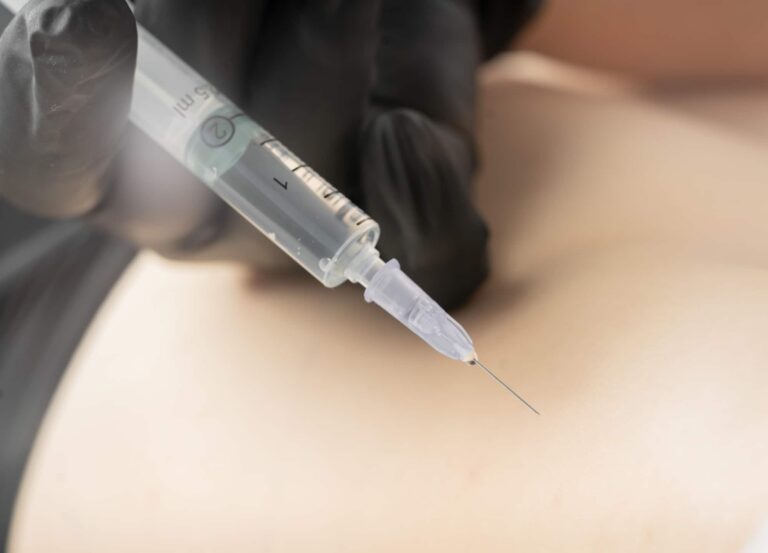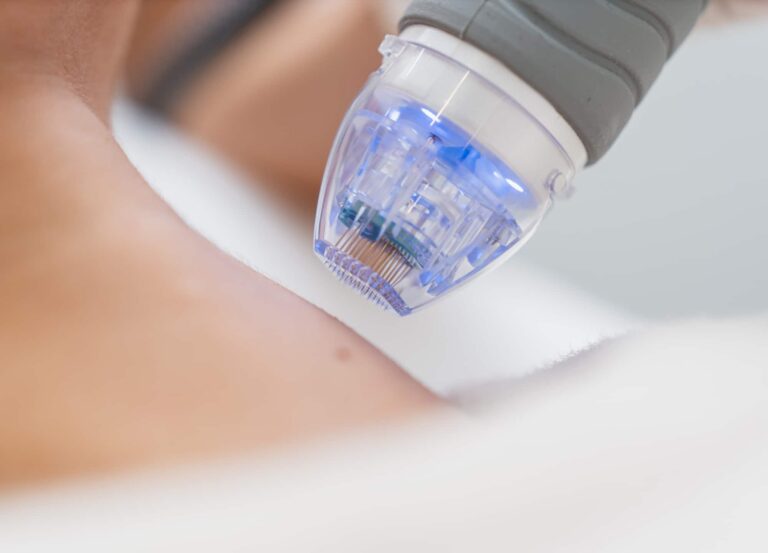Our new series, Closer Look, takes a deeper dive into the controversial, critical, and of-the-moment issues facing doctors and patients in aesthetic medicine.
It pays to have certain professions in your familial circle. Lawyers have letterhead that gets shit done, chefs never ruin the holiday bird, plumbers can snake the shower drain on a weekly basis. In order to truly win the family jackpot though, you need to have a doctor in the mix—someone who spent years pulling all-nighters and racking up student debt just to serve as your group chat’s personal WebMD at 2 a.m.
But it’s not all free-flowing Z-Pak prescriptions and cortisone pimple injections: there are certain guidelines that doctors of every specialty are taught to follow, and one of them applies to relatives. In the American Medical Association’s Code of Medical Ethics, Opinion 8.19 states that “physicians generally should not treat themselves or members of their immediate families” except in cases of emergency, since “the physician’s personal feelings may unduly influence his or her professional medical judgment, thereby interfering with the care being delivered.” In these situations, the AMA notes, “physicians may fail to probe sensitive areas when taking the medical history” or “be inclined to treat problems that are beyond their expertise or training.”
Of course, “should not treat” is a recommendation, not a rule, and it seems to safe to say that situations exist in which it can be ignored. It’s likely fine for the doctor in your family to fill your cavity or administer a flu shot; it’s too risky for a parent to perform a craniectomy on their child or a spouse to come up with a cancer treatment plan for their partner. But things get murky when you move into plastic surgery territory. The most popular procedures carry the potential for serious risks and complications, and personal feelings surely come into play when permanently augmenting the face and body of a loved one; yet according to one study by the Journal of the American Society of Plastic Surgeons, more than 80% of plastic surgeons say they would—and have—performed elective cosmetic surgery on spouses or other family members.
Related: 4 Ways You Could Get Sued by Your Doctor
Can plastic surgeons operate on family?
“By and large, it’s just known that you shouldn’t really treat your family members, whether it’s medicine or surgery,” says Dr. Phillip Craft, a board-certified plastic surgeon in Miami. “In my hometown, there was a resident in plastic surgery who treated his mother with an antibiotic and she ended up having some serious complications—just from a simple prescription. What would happen if the mother ended up dying? Everybody in the family would blame you for writing that prescription forever.” Despite this, he says, it’s “commonplace” for plastic surgeons to operate on their family, and he is open about the fact that he has given his wife, Anna, a breast augmentation and liposuction of the abdomen, waist, and thighs. Not only that, but he’s also worked on his own sister, his sister-in-law, and both his parents-in-law.
According to the study, the main reason doctors operate on family members is their belief that they are the most qualified person for the job. “In my opinion, I can do just as good plastic surgery when it comes to breasts, tummy tucks, and body work as anybody in the country. I would not feel comfortable sending my wife to someone else, knowing that I can do as good a job, if not better. So that’s how I justify it from my point of view,” Dr. Craft says. Anna, he adds, was “completely phobic of needles, to the point where she’d pass out” when she first met him. Slowly, he gained her trust through a little Botox here, a little filler there. After giving birth to their children, she wanted to restore her breasts to what they were before breastfeeding and tone up her body. “On her end, she knows her husband is going to take the best care of her, so why would she go to anyone else?”
Dr. Leonard Hochstein is a board-certified plastic surgeon in Miami whose wife, Lisa, was a cast member of The Real Housewives of Miami (her tagline: “I’m my husband’s best creation”). He says he feels secure in his decision to operate on family because the procedures he’s performing are elective, done only on healthy people, and very rarely go off-course. “I certainly can’t speak to what my judgment would be if I were a trauma surgeon or a cancer surgeon, but the surgeries I do are all very simple, and I do them many times a day. It’s not likely there will be any major surprises, but if there are, I’ve seen them and know how to handle them. If I thought someone else could do it better, I would let them.”
Not every doctor is as sure of their ability to separate personal and professional, especially in cases of emergency. Dr. Gary Linkov, a New York City facial plastic surgeon, says he only recently gave in to his wife’s repeated requests for Botox (“the idea of causing her any discomfort just doesn’t sit well with me”) but would never do the neck lift his mom is “begging” him for. “It’s one thing if everything goes smoothly—but what if it doesn’t? If your spouse is bleeding on the operating table in real time, your judgment is definitely going to be clouded,” he says, adding that there’s no single surgeon so talented that no one else comes close. “There is always someone else who can do it—and should.”
Dr. Craft doesn’t hide that he was nervous the first time he operated on his wife. “When I was marking her up and she was being put to sleep, that was hard. Not only is she my patient, but I also am in love with her and I didn’t want anything to go wrong,” he says. But he likens the experience to flying an airplane: “Once the airplane gets off the ground, you’re just focused on flying the plane. Once you make the incision, it’s not really your wife anymore—it’s a patient you have to do your best job on.”
Related: 7 Things to Know Before Signing a Cosmetic Treatment Consent Form
The idea that a patient is a patient is a patient, whether it’s your wife or a movie star or the mom of three next door, must be kept top of mind if you’re going to operate on family. Dr. Steven Goldman, a board-certified plastic surgeon in Beachwood, Ohio, says, “I think treating a loved one is acceptable, as long as the family member is treated like any other patient in terms of documentation, thorough evaluation, follow-up, etc. It would be unethical if normal treatment pathways, standards, and techniques were not used.”
Dr. Hochstein agrees and says his wife is required to sit in the same waiting room as everyone else, sign the same liability paperwork, and come in for the same follow-up appointments. “When you start to treat people differently, that’s when mistakes happen.”











